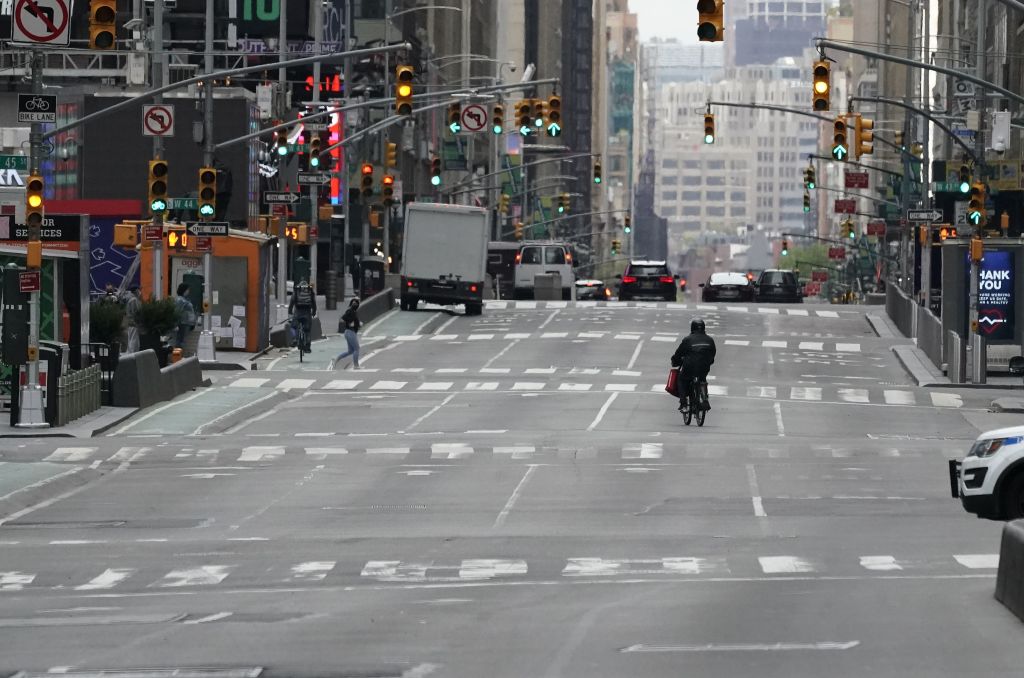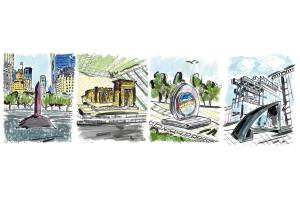We’ve always known Gotham, the sinister side of New York City, but only in the darkest of shadows and in wonderfully elaborate Batman films. Now Gotham is in plain sight and it’s no Broadway set. Those who chose to stay and those who couldn’t leave are here to witness it’s full emergence. The lucky few have flocked to their Hamptons estates, Hudson Valley hideaways or sunny Florida homes. Everyone can’t wait to get back to their ‘normal’ busy lives. The problem is ‘normal’ no longer exists.
Gotham is a place of quiet, with lonely streets and ‘we are closed’ signs on every corner. Some stores have gone so far as to board up their storefronts, a flashback to Hurricane Sandy. New York City residents have protested by covering these boards with flyers reading ‘this business doesn’t trust or support the community, boycott this brand’. Restaurants have turned into online wine shops trying to sell off their cellars in the hope of paying their astronomically high 10-year leases. Others have signed up to make meals for the hungry getting anywhere between $10-12 for a boxed meal, accepting the loss and knowing it’s better than the food going to waste.
The main excitement we get here is going to wait in socially distanced lines at the grocery store. We also look forward to the clanking of pots and pans to celebrate those frontline workers. That reminds us we’re still a part of a community.
For the rest of our time, it’s grieving the loss of a friend or loved one, the constant worry of someone being admitted to the ICU, the calculated cuts needed to keep your small business afloat, or mourning the stability of employment and that now-lost health insurance.
For the truly unfortunate, it’s the frustration of getting through to the government to file for unemployment fully knowing it will only cover a third of their rent. Unemployments’ maximum of $1,100 a week (before taxes) might work for someone who lives in the Midwest, but for someone in NYC it’s barely scratching the surface. It leaves them vulnerable to becoming homeless and standing for hours to get that free boxed meal.
The divide between class, wealth, and color in the Five Boroughs has never been more clear.
If you speak to a banker from Manhattan, they will likely talk about how they’ve never seen a more volatile market. They say this is a ‘faster version of 2008’. How the smartest thing they did was ‘rent another house outside the city’ as they can’t ‘imagine what it’s like to be stuck in a 2,000-sq-ft with two kids’. They wonder if ‘now’s the time to buy real estate in Manhattan’. Should they wait a bit longer?
If you speak to a small business owner from Brooklyn, their first question will be if you applied for the Paycheck Protection Program. They want to find anyone who has received the government funding. Some of the $350 billion allocated for small businesses managed to go to companies that make more than 100 million. No one considers public companies or anyone who pulls in over 100 million a ‘small business’.
If you look at tech company founders, it’s basically the same story. The only addition would be a four-minute video they had time to film and post on social media to show all the altruistic charity work they’ve been doing. It may be annoying but at least it helps.
If you speak to anyone who works for the Mass Transit Authority from the Bronx they will tell you how many of their colleagues the coronavirus has taken. Last week’s count was 84. They’ll tell you how they made their own protective equipment from bandanas and how, thanks to the lack of available cops, they’ve had to protect themselves now that violence is on the rise. They know that, if they are Black or Hispanic, they are twice as likely to die from COVID-19.
Regardless we all sit here and watch the news as Big Pharma, Amazon and convenience store chains like CVS are raising their prices while hospitals with three percent margins can’t even support their medical teams. Healthcare professionals on 18-hour shifts without coffee or food. And PPE? PPE never should have been the gold standard to begin with. It’s third on the CDC’s protocol for infectious diseases — ‘the least effective control’. Consider the emotional trauma healthcare professionals go through on an hourly basis which isn’t even getting reported. It’s like war: we know it’s happening, we see it on TV but no one quite understands the problem because reporting the death toll by the minute is more important and easier for the public to understand.
Medical staff spend their days watching patients all around them gasp for air, knowing each minute they have to decide their fate with no prior research or protocols to fall back on. They administer drugs that make their patients fingers and toes turn black. It’s tough to decide between the risk of death or death. They must wonder: if they paralyze, sedate and intubate a patient, will he or she be one of the 20 percent who actually make it off the ventilator? They must know they could die this way too. And they are thrust into the roles of extended family members every night — asked to pass on last words, to hold up the phone or even a video chat while they hold these people’s fathers, mothers, sister or brothers hands through their latex gloves. We have already seen hospital staff take their lives. No one is mentally capable of handling that amount of stress. No one.
The coronavirus has covered New York City in an awful truth serum — one that has taken the perceptions of equality away. Wealth, class, and color will now decide how you fair in this old familiar Gotham. The question is, will it help us to make the necessary changes, or will New York City and much of the country go back to being much of the same once the coronavirus has passed?
Amy Kalokerinos is the founder and CEO of AKalaid.


















